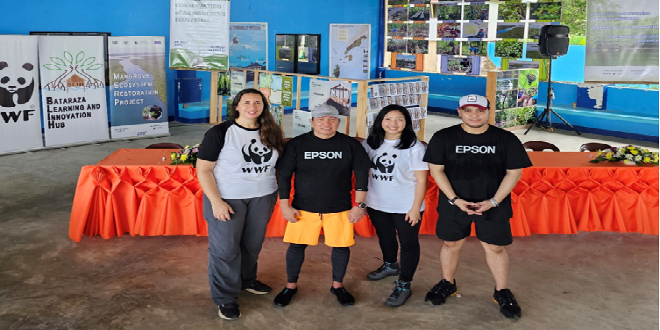
Epson, a global technology leader, has joined forces with World Wide Fund for Nature (WWF) Philippines, EU Ocean Governance, and the local government of Bataraza to launch a groundbreaking Community Learning and Innovation Hub (CLIH) in the picturesque region of Bataraza, Palawan. This initiative marks the inception of a knowledge-sharing network designed to enhance the capabilities of coastal communities by fostering the exchange of knowledge and the dissemination of best practices, all while promoting collaboration among stakeholders.
Coinciding with World Mangrove Day on June 26th, representatives from Epson and WWF graced the CLIH in Barangay Buliluyan, Bataraza, to commemorate this momentous occasion alongside local communities and volunteers.
The restoration project initially took flight in the nearby municipality of Balabac in August 2022, followed by the official launch of the Bataraza Learning and Innovation Hub (BLIH) in January of the current year. Collaborating closely with partners in Balabac and Bataraza, the project is executing a comprehensive local capacity development program encompassing various aspects of ecosystem restoration, including biophysical, socio-economic, and governance components, as well as community knowledge exchange.
This undertaking is a crucial part of the WWF-Coral Triangle Programme, focusing on the Sulu-Sulawesi Seascape—an expansive marine ecoregion shared with Indonesia and Malaysia, renowned for its extraordinary marine biodiversity. Epson, in tandem with WWF, lends its support to this regional partnership aimed at establishing scalable conservation efforts, primarily centered on revitalizing degraded or damaged coral reefs and mangrove areas. Through these restoration endeavors, best practices and invaluable insights are shared through community learning and innovation hubs, while local champions are trained for the co-management of rejuvenated and existing coral reef and mangrove zones.
Masako Kusama, President and Director of Epson Philippines Corporation, emphasized, “This is just one step towards our global commitment of reaching out to communities and continuing our support towards restoring and protecting the Philippines’ rich biodiversity. Our continuing partnership with WWF enables us to work toward a shared goal of a greener future for all.”
Mary Joan Pecson, Project Manager at WWF-Philippines, added, “Since the launch of the Bataraza Learning and Innovation Hub (BLIH) and other succeeding activities involving the local government unit, the community, the private sector including the academe and civil society organizations, we have been empowering communities by enabling them to share and gain knowledge and practice from each other.”
Mangroves, hailed as one of the nature-based solutions to combat climate change, play a pivotal role in ecosystems, offering benefits to both nature and humanity. These unique coastal forests store significantly more carbon per acre than tropical forests, contributing to the mitigation of global greenhouse gas emissions. Tragically, between 2000 and 2016, 62% of the world’s mangroves succumbed to destruction.
Hon. Abraham Ibba, Mayor of Bataraza, expressed his support for conservation efforts, asserting, “Our Local Government strongly supports conservation initiatives geared towards protecting the mangroves in Bataraza. By establishing partnerships with multi-sectoral groups and the coastal communities, we innovate long-term solutions to restore degraded coastal and marine ecosystems and prioritize the welfare of our people.”
Reynaldo Rivera, Municipal Environmental and Natural Resource Officer of Bataraza, elaborated on the repercussions of mangrove forest destruction, explaining how it affects not only the environment and marine life but also the community’s safety and well-being.
The Learning Hub in Bataraza stands as a beacon of best practices, poised to serve as a model for replication in other locations within the Coral Triangle. With Epson’s unwavering support and collaboration from partner stakeholders, WWF-Philippines aspires to expand this initiative to neighboring areas, fostering a more climate-resilient future for communities across the region.


